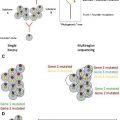Activating mutations in the epidermal growth factor receptor (EGFR) are present in approximately 15% of US patients with lung adenocarcinoma. EGFR tyrosine kinase inhibitors are associated with high response rate and progression-free survival for patients with non–small cell lung cancer with this genotype. Gefitinib, erlotinib, and afatinib are the EGFR tyrosine kinase inhibitors that are presently in clinical use. Understanding resistance mechanisms has led to the identification of a secondary mutational target, T790M, in more than half of patients, for which osimertinib has been approved. This article reviews the current treatments, resistance mechanisms, and strategies to overcome resistance.
Key points
- •
Activating mutations in the epidermal growth factor receptor (EGFR) are present in approximately 15% of patients with lung adenocarcinoma in the United States.
- •
EGFR tyrosine kinase inhibitors (TKIs) are associated with high response rate and progression-free survival for patients with non–small cell lung cancer with this genotype.
- •
Gefitinib, erlotinib, and afatinib are the 3 approved 1st line TKIs for EGFR mutated non-small cell lung cancer (NSCLC).
- •
Understanding resistance mechanisms has led to the identification of a secondary mutational target, T790M, in more than half of patients, for which osimertinib, a third-generation TKI, has been developed and approved. Other resistance mechanisms besides T790M seem to be more complex because of tumor heterogeneity and multiple overlapping pathways, requiring better methods for detection and monitoring.
- •
This article reviews the current treatments, resistance mechanisms, and strategies to overcome resistance.
Stay updated, free articles. Join our Telegram channel

Full access? Get Clinical Tree




